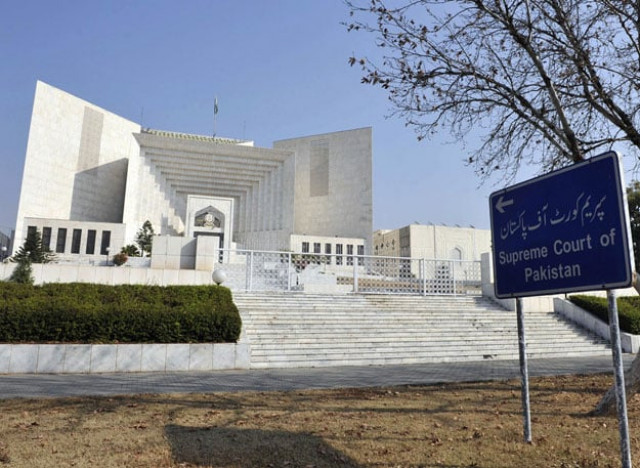Supreme Court upholds establishment of military courts
Chief justice says superior judiciary has authority to review judgments of military courts

In a landmark judgment, the Supreme Court dismissed all petitions against the establishment of the controversial military courts in a majority vote on Wednesday.
The apex court, in an 11-6 decision, dismissed a slew of petitions against the 21st Constitutional Amendment, wherein military courts have been established to try militants.
The court, however, stated that all decisions of military courts would be subject to judicial review.
The 21st Constitutional Amendment was passed in January as part of a crackdown on militancy following a Taliban massacre at the Peshawar Army Public school which left more than 150 people -- mostly students -- dead.
A 17-judge full bench also dismissed petitions against the 18th Constitutional Amendment in a wide 14-3 decision.
While announcing the judgment, Chief Justice Nasirul Mulk said, "In view of the respective opinions recorded above, by a majority of 13 to 4, these Constitution amendments are held to be maintainable.”
“However, by a majority of 14 to 3, the Constitution petitions challenging the Constitution (18th Amendment) Act (Act X of 2010) are dismissed, while by a majority of 11 to 6 the Constitution petitions challenging the Constitution (21st Amendment) Act (Act 1 of 2015) and the Pakistan Army (Amendment) Act (Act II of 2015) are dismissed," he added.
A two-judge bench, headed by Chief Justice Nasirul Mulk and comprising Justice Dost Muhammad Khan, announced the decision of the lager bench early Wednesday morning.
Military court decisions subject to judicial review
In a detailed judgement, Chief Justice Nasirul Mulk declared that the superior judiciary has the authority to review any ruling of military courts on grounds of coram non judice (being without jurisdiction or suffering from mala fide).
The chief justice declared that the superior judiciary had the authority to review the government’s selection of cases and refer them for trial under the Pakistan Army Act, 1952. However, he added any order passed, decision taken or sentence awarded shall be subject to judicial review.
According to the judgment, there are no limitations, express or implied on the powers of Parliament to amend the Constitution and the amendments brought about in exercise of such power are not liable to be challenged on any ground whatsoever before any court.
“As this court lacks jurisdiction to strike down any amendment in the Constitution, it is not necessary to examine the grounds on which the 18th and the 21st Amendments have been challenged. However, the decision to select and refer the case of any accused for trial under the Pakistan Army Act, 1952, as amended, and any order passed or decision taken or sentence awarded in such trial shall be subject to judicial review on the grounds of corum non judice, being without jurisdiction or suffering from mala fide. With this observation all the petitions are dismissed”
On January 28, a three-judge bench accepted pleas against 21st Constitutional amendment for regular hearing and sought concise statements from the federal and provincial governments.
Later, a 17-judge full court of the Supreme Court, headed by Chief Justice Mulk, clubbed the 18th and 21st constitutional amendment cases and heard the arguments for several weeks.
During lengthy legal battle, the Supreme Court examined petitions challenging the procedure of judges appointment under the 18th Amendment and the establishment of military courts under the 21st Amendment.
The full court on June 26 reserved its ruling on the case. A total of 35 constitutional petitions were before the court of which 20 challenged the 18th Amendment and 15 challenged the 21st Amendment.
After intense legal wrangling, the apex court is expected to announce ruling on three questions: (i) whether the Constitution has a basic structure or not; (ii) if it has a basic structure then whether a constitutional amendment can be struck down on the basis of it; and (iii) whether the parliament has the power to alter the basic structure of the Constitution.
Military courts are empowered to try militant suspects until February 2017. The army announced the first verdicts and sentences from the new courts in April. Six militants were condemned to death and another jailed for life, all on terrorism charges, though scant details of the offences and trials were given.
The Supreme Court suspended the sentences while it heard the legal challenge to the courts.






1733130350-0/Untitled-design-(76)1733130350-0-208x130.webp)












COMMENTS
Comments are moderated and generally will be posted if they are on-topic and not abusive.
For more information, please see our Comments FAQ